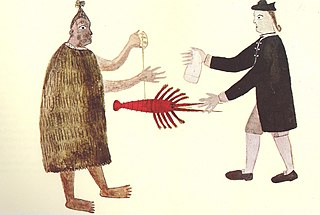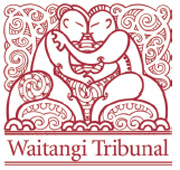
The Treaty of Waitangi, sometimes referred to as Te Tiriti, is a document of central importance to the history of New Zealand, its constitution, and its national mythos. It has played a major role in the treatment of the Māori people in New Zealand by successive governments and the wider population, something that has been especially prominent from the late 20th century. The treaty document is an agreement, not a treaty as recognised in international law, and has no independent legal status, being legally effective only to the extent it is recognised in various statutes. It was first signed on 6 February 1840 by Captain William Hobson as consul for the British Crown and by Māori chiefs from the North Island of New Zealand.

Waitangi Day, the national day of New Zealand, marks the anniversary of the initial signing—on 6 February 1840—of the Treaty of Waitangi. The Treaty of Waitangi was an agreement towards British sovereignty by representatives of the Crown and indigenous Māori chiefs, and so is regarded by many as the founding document of the nation.

The Waitangi Tribunal is a New Zealand permanent commission of inquiry established under the Treaty of Waitangi Act 1975. It is charged with investigating and making recommendations on claims brought by Māori relating to actions or omissions of the Crown, in the period largely since 1840, that breach the promises made in the Treaty of Waitangi. The Tribunal is not a court of law; therefore, the Tribunal's recommendations and findings are not binding on the Crown. They are sometimes not acted on, for instance in the foreshore and seabed dispute.

Public holidays in New Zealand consist of a variety of cultural, national, and religious holidays that are legislated in New Zealand. Workers can get a maximum of 12 public holidays and a minimum of 20 annual leave days a year.
The New Zealand foreshore and seabed controversy is a debate in the politics of New Zealand. It concerns the ownership of the country's foreshore and seabed, with many Māori groups claiming that Māori have a rightful claim to title. These claims are based around historical possession and the Treaty of Waitangi. On 18 November 2004, the New Zealand Parliament passed a law which deems the title to be held by the Crown. This law, the Foreshore and Seabed Act 2004, was enacted on 24 November 2004. Some sections of the act came into force on 17 January 2005. It was repealed and replaced by the Marine and Coastal Area Act 2011.

Ngāpuhi is a Māori iwi associated with the Northland regions of New Zealand centred in the Hokianga, the Bay of Islands, and Whangārei.

Shane Geoffrey Jones is a New Zealand politician and a member of the New Zealand House of Representatives for the New Zealand First party.

The constitution of New Zealand is the sum of laws and principles that determine the political governance of New Zealand. Unlike many other nations, New Zealand has no single constitutional document. It is an uncodified constitution, sometimes referred to as an "unwritten constitution", although the New Zealand constitution is in fact an amalgamation of written and unwritten sources. The Constitution Act 1986 has a central role, alongside a collection of other statutes, orders in Council, letters patent, decisions of the courts, principles of the Treaty of Waitangi, and unwritten traditions and conventions. There is no technical difference between ordinary statutes and law considered "constitutional law"; no law is accorded higher status. In most cases the New Zealand Parliament can perform "constitutional reform" simply by passing acts of Parliament, and thus has the power to change or abolish elements of the constitution. There are some exceptions to this though – the Electoral Act 1993 requires certain provisions can only be amended following a referendum.
Claims and settlements under the Treaty of Waitangi have been a significant feature of New Zealand politics since the Treaty of Waitangi Act 1975 and the Waitangi Tribunal that was established by that act to hear claims. Successive governments have increasingly provided formal legal and political opportunity for Māori to seek redress for what are seen as breaches by the Crown of guarantees set out in the Treaty of Waitangi. While it has resulted in putting to rest a number of significant longstanding grievances, the process has been subject to criticisms including those who believe that the redress is insufficient to compensate for Māori losses. The settlements are typically seen as part of a broader Māori Renaissance.

The Treaty of Waitangi Act 1975 gave the Treaty of Waitangi recognition in New Zealand law for the first time and established the Waitangi Tribunal. The tribunal was empowered to investigate possible breaches of the Principles of the Treaty of Waitangi by the New Zealand Government or any state-controlled body, occurring after 1975. It was also empowered to recommend, but not enforce, remedies.

The New Zealand Day Act 1973 made 6 February a public holiday in New Zealand. The day had been known for some time as Waitangi Day and commemorated the signing of the Treaty of Waitangi. In 1960 the first Waitangi Day Act was passed by the second Labour Government, enabling any area of the country to substitute a Waitangi Day holiday for its provincial anniversary day. This was done for Northland in 1963 through the Waitangi Day Amendment Act passed by the second National Government.
The Fourth Labour Government of New Zealand governed New Zealand from 26 July 1984 to 2 November 1990. It was the first Labour government to win a second consecutive term since the First Labour Government of 1935 to 1949. The policy agenda of the Fourth Labour Government differed significantly from that of previous Labour governments: it enacted major social reforms and economic reforms.

The Third National Government of New Zealand was the government of New Zealand from 1975 to 1984. It was an economically conservative government that aimed to preserve the Keynesian economic system established by the First Labour government and was also socially conservative. Throughout its three terms it was led by Robert Muldoon, a populist but antagonistic politician who was sometimes described as the National Party's best asset and worst liability.

Auckland Anniversary Day is a public holiday observed in the northern half of the North Island of New Zealand, being the area's provincial anniversary day. It is observed throughout the historic Auckland Province, even though the provinces of New Zealand were abolished in 1876. The modern area of observation consists of all of the Northland, Auckland, Waikato, Bay of Plenty and Gisborne regions, as well as some parts of the Manawatū-Whanganui and Hawke's Bay regions north of the 39th parallel. The holiday falls on the Monday closest to 29 January, the anniversary of the arrival of William Hobson, later the first Governor of New Zealand, in the country in 1840.

The Third Labour Government of New Zealand was the government of New Zealand from 1972 to 1975. During its time in office, it carried out a wide range of reforms in areas such as overseas trade, farming, public works, energy generation, local government, health, the arts, sport and recreation, regional development, environmental protection, education, housing, and social welfare. Māori also benefited from revisions to the laws relating to land, together with a significant increase in a Māori and Island Affairs building programme. In addition, the government encouraged biculturalism and a sense of New Zealand identity. However, the government damaged relations between Pākehā and Pasifika New Zealanders by instituting the Dawn Raids on alleged overstayers from the Pacific Islands; the raids have been described as "the most blatantly racist attack on Pacific peoples by the New Zealand government in New Zealand’s history". The government lasted for one term before being defeated a year after the death of its popular leader, Norman Kirk.

The Second National Government of New Zealand was the government of New Zealand from 1960 to 1972. It was a conservative government which sought mainly to preserve the economic prosperity and general stability of the early 1960s. It was one of New Zealand's longest-serving governments.
The Māori protest movement is a broad indigenous rights movement in New Zealand. While there was a range of conflicts between Māori and European immigrants prior to the signing of the Treaty of Waitangi in 1840, the signing provided one reason for protesting. Disagreements in the decades following the signing sometimes included war.
The law of New Zealand uses the English common law system, inherited from being a part of the British Empire.

In New Zealand law and politics, the principles of the Treaty of Waitangi is a phrase used in the Treaty of Waitangi Act 1975. It is a set of principles derived from, and interpreting, the Treaty of Waitangi. These principles were codified in 1987, partly an attempt to reconcile the different Māori and English language versions of the treaty, and allow the application of the treaty to a contemporary context.
Hobson's Pledge is a right-wing lobby group in New Zealand that was formed in late September 2016 to oppose affirmative action for Māori people. It is led by conservative politician Don Brash. The group aims to nullify the partnership between the Crown and Māori, remove the Māori electorates, abolish the Waitangi Tribunal, restrict tribal powers and "remove all references in law and in Government policy to Treaty 'partnership' and 'principles'".












